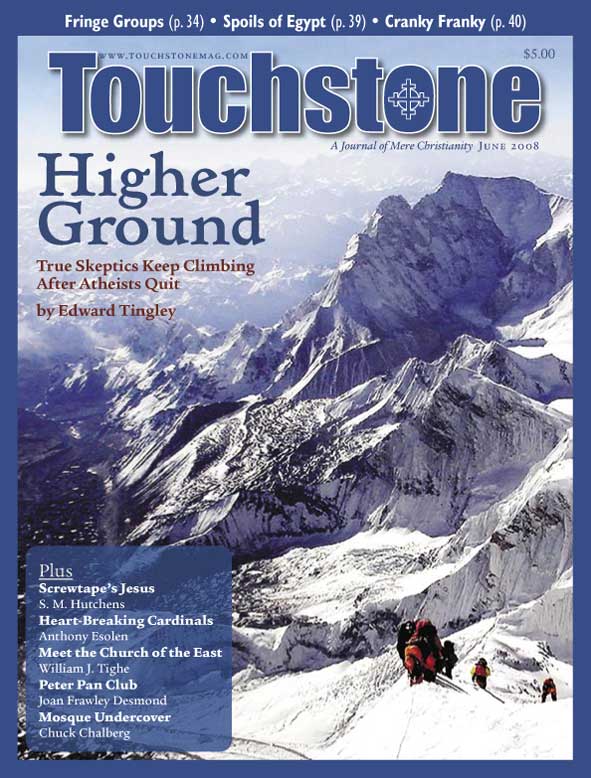Filtered Fringe
Righteous: Dispatches from the Evangelical Youth Movement
by Lauren Sandler
Viking, 2006
(272 pages, $24.95, hardcover)
reviewed by Ryan T. Anderson
Depressed by the re-election of George W. Bush—which, she says, “knocked the air from my lungs and the hope from my heart”—Lauren Sandler set out across the country to discover exactly who the “values voters” were, particularly the young ones.
Socially liberal, ethnically Jewish, and theologically atheistic, Sandler—a fellow at New York University’s Cultural Reporting and Criticism program who previously worked as a producer of cultural segments for National Public Radio and as the Life Editor of Salon—had the advantage of an outsider’s perspective. Or so she hoped.
Her results, offered in Righteous: Dispatches from the Evangelical Youth Movement, are provocative. The “Disciple Generation,” her name for Christians aged 15 to 35, have rebelled not only against their parents but against everything secular as well. How? By appropriating the trappings of popular culture but saturating them with the gospel of Jesus Christ.
Tattoos & Suits
This results in tattooed, skateboarding Jesus freaks; rapping, prosperity-gospel-preaching fundamentalists; and grunge, Rock-for-Life anti-abortion groupies—alongside three-piece-suit-wearing collegians; Bible-carrying Capitol Hill staffers; and frappuccino-sipping, mega-church-attending suburbanites. In other words, for every secular walk of life, there is the Disciple Generation equivalent, breathing in the same cultural air but exhaling the name of Jesus.
Sandler offers many amusing, sometimes disturbing, vignettes from her journeys with the “Disciples.” Reporting from a skateboarding festival, she tells of pro skater Josh Casper, who became a Christian after “depression set in” when his father passed away. He tells the crowd during a break in the skating: “It’s all about God. That’s what I’m skating for. That’s what I’m living for.”
For the skater who is often a cultural outcast, Josh’s message offers “hope, connection, and community all mixed with cool,” Sandler argues. “This is how they got these kids to buy into religion, by delivering something larger than themselves, their troubles at home, and their adolescent pain.”
But with the religion comes the politics, and the t-shirts Sandler sees at Rock for Life, Stand True, and Cornerstone events speak volumes to her. She describes “a black shirt with an image of the American flag, only a white swastika replaces its fifty stars. Under the flag, his shirt says WHAT HAPPENS WHEN WE DON’T VOTE. . . . Beside it another is printed with the words PERSONHOOD REDEFINED: DRED SCOTT, THE NAZI PARTY, ROE VS. WADE.”
At first, she thinks these are a “nice reminder of the importance of participatory democracy.” But later she concludes, “ I’m what happens when they don’t vote. To these dissidents professing Christ’s love, I’m a Nazi in the abortion holocaust.”
As Sandler sees it, young Evangelicals recognize the central failures of modern society: brokenness, disconnection, and lack of community. They turn to Evangelicalism for emotional security and meaningful relationships, and they are given doses of biblical absolutism and culture crusades in addition—for on her view, they obsess over politics and cultural changes, particularly regarding abortion, same-sex “marriage,” prayer in schools, and evolution.
Limited Understanding
Sandler would view it this way, though, for in important respects her book tells us more about her—and her fellow secularists—than about Evangelicals. A liberal “unrepented atheist Jew,” she simply lacks the theological sensibility needed to analyze Evangelicals through anything other than political or cultural categories. Her commentary and periodic sarcasm make her limitations all too clear.
Repeatedly she fails to understand the Disciples, expressing incredulity, frustration, and angst: that of all the people she met, only one would “admit” to believing that “faith is necessarily divorced from reason”; that the students of Patrick Henry College who have read the entire Western canon still believe that the Bible is true; that pro-life missionaries “travel to see babies dying across the globe and still focus their energy to save the unborn instead of the living”; that women forfeit equality to stay at home and raise kids.
She repeatedly dismisses the intelligent-design (ID) argument as nothing more than the “Whoa Principle,” as in “ Whoa, the level of complexity in a cell is mind-boggling.” Even someone with reservations about the ID argument, as I have, can see that it is much more serious than this.
Everyone she features had to have something about him that would scandalize her readership. They’re misogynistic! They’re anti-intellectual! They’re consumerist! They’re conformist! They’re Republican!
But granting that the stories she relates are true, her omission of all but the extremes of Evangelicalism undermines her conclusions. She focuses only on the cultural aspects that set it most apart from mainstream life, and even then her examples would make most Evangelicals blush.
Her ideologically selective reporting conflicts with her thesis that for every walk of life in modern culture there is a Christian counterpart. For every graduate of Patrick Henry College now working on the Hill, there are several from Princeton and Yale. For every grunge Rock for Lifer, tattooed skater, and prosperity-gospel believer, there is a prison visitor, a student government leader, a soup-kitchen organizer.
For every emotion-based conversion, there is a reason-driven encounter with the gospel. There are Evangelicals in the subculture she describes with such anxiety, and there are Evangelicals in the Ivy League, at the Supreme Court, and on Wall Street.
Her selective reporting has other effects. She set out to write after the 2004 election, and at the beginning of the 2008 election, the big story in religion and politics is “the Evangelical crack-up,” particularly among young Evangelicals. How strange that she saw no signs of this during her investigations. She might have seen it coming if she had looked at Evangelicals more widely and fairly.
Secular Poverty
Nonetheless, Sandler’s description should make Christians pause. Portions of the Disciple Generation have uncritically baptized many forms of modern culture, and much of it is coarse, vulgar, and vain.
Portions have rejected “churchy” religion, which includes much of classical Evangelicalism, and have thereby forfeited the great wisdom of the liturgical, doctrinal, and spiritual traditions of historical Christianity. The continued emphasis on emotion and the relative neglect of reason are problematic, to say the least.
But while she found their fideism off-putting and their politics terrifying, she admitted the poverty of secular alternatives. “The secular left can’t even find the words to express why life is worth living; we can’t even play the game,” she says at one point, and at another, “We need to lift people out of their own personal hells to find some heaven on earth.”
Again, we see that she can only account for the appeal of Evangelicalism by means of social analysis. If only she had seen that the Disciple Generation wasn’t primarily a response to the social woes of contemporary society. The response is theological, and you can hear the Disciples pray, with Augustine: “You have made us for yourself, O Lord, and our hearts are restless until they rest in you.” This isn’t a response to modern life—it’s a response to the human condition.
Sandler might have seen this if she had broadened her travels. I wish that her Evangelical sightseeing had brought her to any of my Evangelical former roommates. She wouldn’t have found them in mosh-pits, prosperity mega-churches, or the front lines of defense for Young-Earth Creationism. Instead, she’d find one at Oxford doing graduate work in philosophy and ministering to prisoners on the weekends, one in Philadelphia helping the urban poor find employment, and another in graduate school studying Islam after learning Arabic in Cairo.
If she is correct that Evangelicals come from all walks of life, she might have spilt some ink on those whom it would be harder for her audience to dismiss out of hand. But no one like them, or like any of the Evangelicals I have met at Princeton and in Manhattan, makes an appearance in her pages.
Moving Compassion
Which is too bad; they might have helped her come to a more complete understanding of the Evangelical phenomenon, and maybe even to embrace it herself. For while she found the Disciple Generation’s religious beliefs silly and their political agenda scary, repeatedly she was moved—sometimes even to tears—by their genuine goodness and compassion.
Their love moved her to her own near-conversion experience. One night during praise and worship, she felt what so many had described to her:
The worship band is playing. Suddenly, I feel a brokenness inside. And I can’t stop crying. . . . In my moment of vulnerability, had I desired to open my arms to a community of believers who would welcome me with potlucks, punk rock, and all the agape a girl could want, their ready-made package of support and certainty would have fallen into place.
But she praises herself for being too smart—with the “volumes that line my bookshelves” and the education that “steeled my rational philosophy”—to fall for Evangelicalism. Had she realized that the great majority of Evangelicals wouldn’t compare her to the Nazis, aren’t looking to get rich quick, and don’t use their faith as an emotional crutch, she might have discovered what really drew them to Christ. She might have found that faith and reason go together for the Disciples, and that they lead to Truth.
subscription options
Order
Print/Online Subscription

Get six issues (one year) of Touchstone PLUS full online access including pdf downloads for only $39.95. That's only $3.34 per month!
Order
Online Only
Subscription

Get a one-year full-access subscription to the Touchstone online archives for only $19.95. That's only $1.66 per month!
bulk subscriptions
Order Touchstone subscriptions in bulk and save $10 per sub! Each subscription includes 6 issues of Touchstone plus full online access to touchstonemag.com—including archives, videos, and pdf downloads of recent issues for only $29.95 each! Great for churches or study groups.
Transactions will be processed on a secure server.
more on Book Review from the online archives
more from the online archives

23.6—November/December 2010
Darwin, Design & Thomas Aquinas
The Mythical Conflict Between Thomism & Intelligent Design by Logan Paul Gage
calling all readers
Please Donate
"There are magazines worth reading but few worth saving . . . Touchstone is just such a magazine."
—Alice von Hildebrand
"Here we do not concede one square millimeter of territory to falsehood, folly, contemporary sentimentality, or fashion. We speak the truth, and let God be our judge. . . . Touchstone is the one committedly Christian conservative journal."
—Anthony Esolen, Touchstone senior editor








